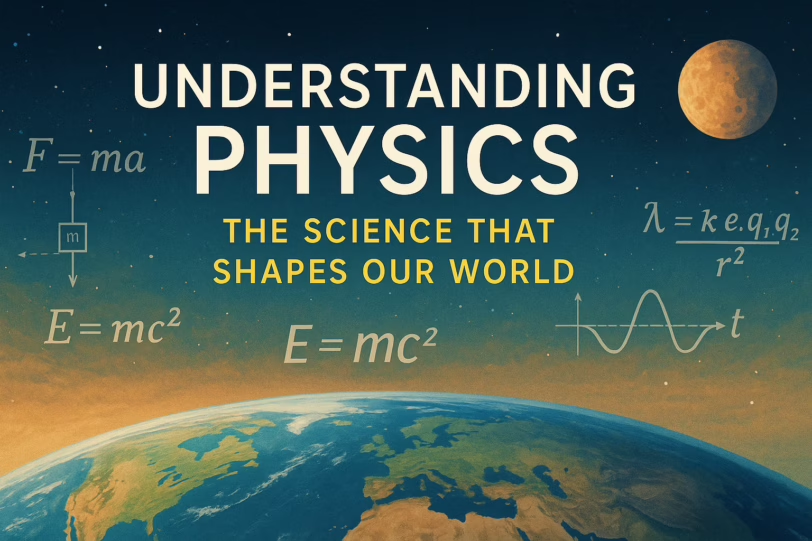Physics is one of the most foundational disciplines in Science, dedicated to uncovering how the universe operates. From the interactions of subatomic particles to the vast mechanics of galaxies, Physics equips us with the principles and tools needed to understand matter, energy, space and time.
What is Physics?
Physics is the scientific exploration of the fundamental laws that govern nature. It explains how and why objects move, how forces act and how various forms of energy interact with matter. Whether it’s understanding the orbit of planets, the properties of light or the structure of atoms, Physics seeks to reveal the rules underpinning the natural world.
Key Branches of Physics
Physics is an extensive field, broadly categorized into several major branches:
• Classical Physics
Concerned with the laws of motion and gravitation (notably those established by Sir Isaac Newton), as well as acoustics, optics, and thermodynamics within macroscopic contexts.
• Modern Physics
Explores quantum mechanics and Einstein’s theories of relativity, which describe the behaviour of matter and energy at atomic and subatomic levels, and at velocities approaching the speed of light.
• Thermodynamics
Studies heat, energy transfer, temperature, and the principles governing physical systems in equilibrium.
• Electromagnetism
Investigates electric and magnetic fields, their interactions, and their influence on matter. This branch underpins many technologies, from electric motors to wireless communication.
• Nuclear and Particle Physics
Focuses on atomic nuclei, radioactive decay, and fundamental particles such as quarks and leptons, contributing to the development of nuclear energy and particle accelerators.
• Astrophysics and Cosmology
Examines celestial phenomenon, the lifecycle of stars, the structure of galaxies and the origins and evolution of the universe.
Why Physics Matters?
Physics is integral to both scientific discovery and everyday innovation. Its significance can be seen in the following areas:
• Technological Advancements
From smartphones and MRI scanners to satellite navigation and renewable energy systems, many modern technologies are rooted in physical principles.
• Scientific Understanding
Physics helps us answer fundamental questions about the universe, such as why is the sky blue, what causes tides or how black holes are formed.
• Critical Thinking and Problem-Solving
Physics education sharpens analytical skills, fosters logical reasoning and enhances quantitative analysis. These qualities are highly valued across diverse professions.
• Interdisciplinary Relevance
Physics underpins numerous scientific domains including Chemistry, Environmental Science and Biology, making it a cornerstone of STEM education.
Notable Physicists and Their Contributions
- Sir Isaac Newton: Formulated the laws of motion and universal gravitation, laying the groundwork for classical mechanics.
- Albert Einstein: Revolutionised Physics with the theories of special and general relativity, altering our understanding of time, space, and gravity.
- Marie Curie: Pioneered research into radioactivity and became the first person to win two Nobel Prizes in different scientific fields (Physics and Chemistry).
- Richard Feynman: Made major contributions to quantum electrodynamics and was renowned for his work in science education and popularisation.
Physics in Everyday Life
Physics isn’t just confined to laboratories or scientific theory—it’s embedded in daily life:
• The motion of vehicles and the mechanics of transport.
• The generation and distribution of electricity in homes.
• The operation of electronic devices such as smartphones, televisions, and computers.
• The principles of aerodynamics in sports and engineering.
• The safety mechanisms in lifts and rollercoasters.
Conclusion
Physics is not merely an academic subject. It is a gateway to understanding the universe and driving innovation. By studying Physics, we not only gain scientific knowledge, instead we develop a mindset that values curiosity, critical analysis and creative problem solving. Whether applied in research, industry or daily life, Physics continues to shape the modern world and pave the way for future breakthroughs.



